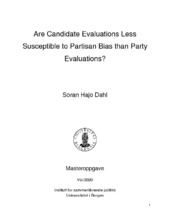| dc.description.abstract | According to the personalization hypothesis, voters’ attention is shifting away from collective entities like political parties to individual candidates. As attitudes towards candidates are growing more consequential in electoral dynamics, considerable attention has been devoted to the question of what differentiates these from attitudes directed at parties. This literature has focused on the component of attitudes known as impressions, defined broadly as the content of attitudes. Far less attention has been devoted to exploring what differentiates party and candidate evaluations from each other. In addressing this gap in the literature, this thesis examines the claim that candidate evaluations are less susceptible to partisan bias than party evaluations. Two methods are used to test this claim; a survey experiment conducted on a representative sample of Norwegian citizens, and an observational study using panel data collected during the run-up to the 2017 German federal election. The results support the hypothesis that candidate evaluations are less susceptible to partisan bias than party evaluations. | en_US |
